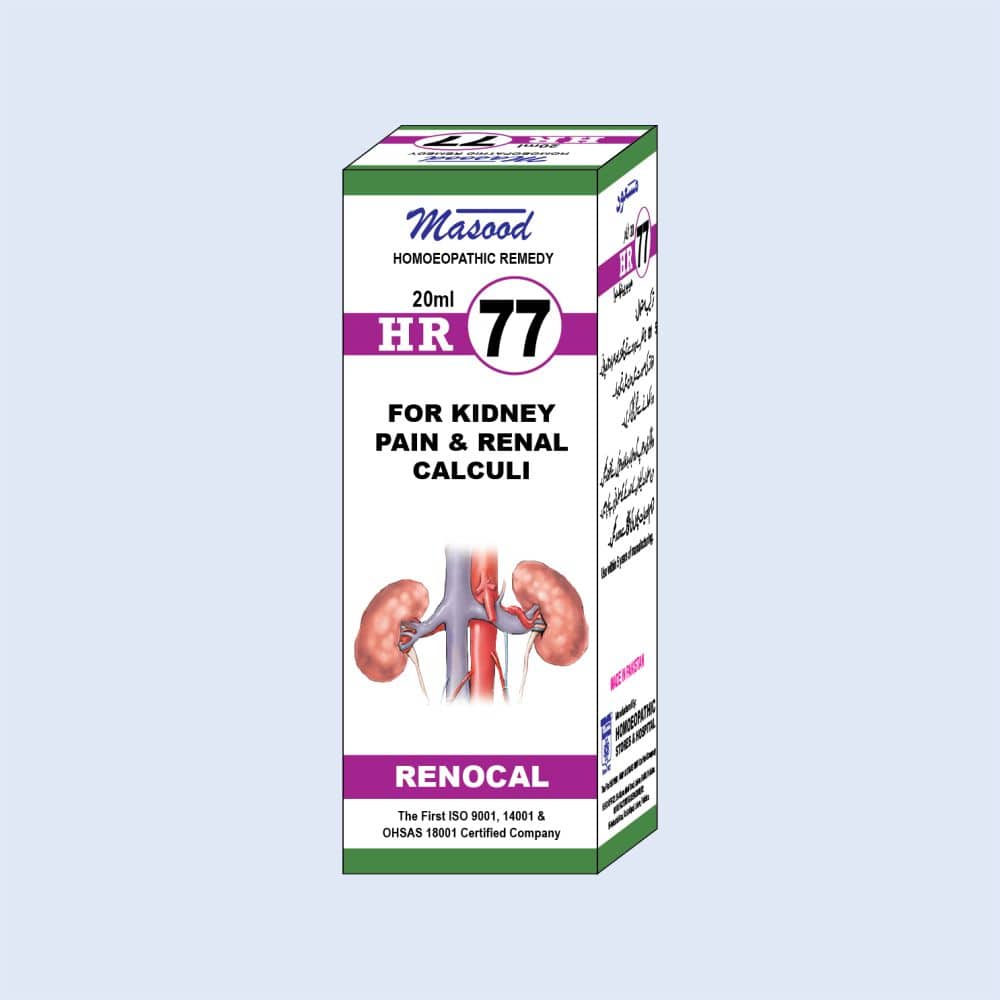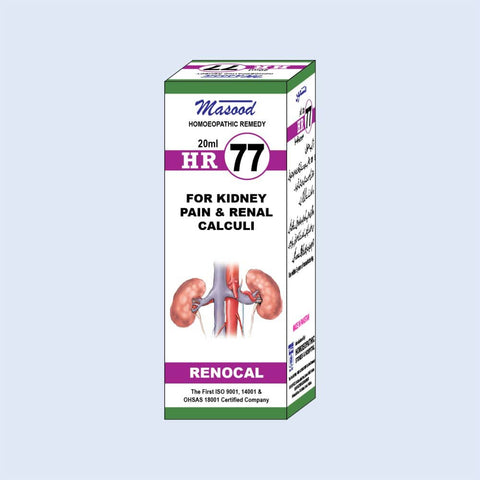56-M, Quaid-e-Azam Industrial Estate, Lahore, Pakistan


HR-77 (RENOCAL)
- Rs.210.00
-
- Rs.210.00
- Unit price
- per
Description
xHR 77 is the best homoeopathic treatment for Kidney Stone (Renal Calculi.) & Kidney Pain
- Indicated in incontinence urine and burning micturition.
- Effective for reddish urine due to renal calculi.
- Diminishes the flank pain and pain before urination.
- Also used for protein urea.
Presentation: Bottle of 20 ml.
Information For Doctors
Introduction:
Renal calculi:
Kidney stones, or renal calculi, are solid masses made of crystals. Kidney stones usually originate in kidneys. However, they can develop anywhere along urinary tract, which consists of these parts:
- kidneys
- ureters
- bladder
- urethra
Kidney stones are one of the most painful medical conditions. The causes of kidney stones vary according to the type of stone.
Not all kidney stones are made up of the same crystals. The different types of kidney stones include:
Calcium
Calcium stones are the most common. They’re often made of calcium oxalate (though they can consist of calcium phosphate or maleate). Eating fewer oxalate-rich foods can reduce risk of developing this type of stone. High-oxalate foods include:
- potato chips
- peanuts
- chocolate
- beets
- spinach
- tomatoes
However, even though some kidney stones are made of calcium, getting enough calcium in diet can prevent stones from forming.
Uric acid
This type of kidney stone is more common in men than in women. They can occur in people with gout or those going through chemotherapy.
This type of stone develops when urine is too acidic. A diet rich in purines can increase urine’s acidic level. Purine is a colorless substance in animal proteins, such as fish, shellfish, and meats.
Struvite
This type of stone can be large and cause urinary obstruction. They result from a kidney infection. Treating an underlying infection can prevent the development of struvite stones.
Cystine
Cystine stones are rare. They occur in both men and women who have the genetic disorder cystinuria. With this type of stone, cystine — an acid that occurs naturally in the body — leaks from the kidneys into the urine.
Causes:
Kidney stones form when urine contains more crystal-forming substances (such as calcium, oxalate and uric acid) than the fluid in urine can dilute.
Symptoms:
Most common symptoms can include:
- Pain on urination
- Pink, red or brown urine
- Cloudy or foul-smelling urine
- Nausea and vomiting
- Persistent need to urinate
- Urinating more often than usual
- Fever and chills if an infection is present
- Urinating small amounts
Indications:
Symptoms of renal calculi usually occurs if the kidney stone:
- Gets struck in your kidney
- Starts to travel down
- Increased too much in size
Common signs and symptoms of kidney stone include:
- Feeling restless and unable to lie still
- Nausea
- Bloody, cloudy, or smelly urine
- Burning during water making and fever
- Frequent desire to urine pass
- Pain during urination
Masood’s HR 77in all types of renal calculus symptoms, it dissolves and clears kidney stone quickly and smoothly.
Pharmacology:
HR 77 has potential antiurolithic effect, tested for the antioxidant and diuretic effects, in treatment of urolithiasis, stone preventive and curative activities. Antioxidant potential of HR 77 was estimated by lipid peroxidation inhibitory activity. HR 77 is super antioxidant such as vitamin E, catechin and selenium can protect against oxidative injury by oxalate and crystal deposition while some urinary macromolecules such as glycosaminoglycans, bikunin, uropontin, uromodulin etc. are also shown to possess protective effect against oxalate injury. HR 77 has diuretic effect, as berberinein it increases urine excretion. Increase in the urine volume was also accompanied by an increase in the Na+ and K+ excretion similar to the standard diuretic, hydrochlorothiazide, suggesting that berberine induced diuresis is caused by its saluretic effect. Treatment with HR 77 also increased urine pH and decreased urine Ca2+ content. Urinary supersaturation with stone forming minerals is a primary requisition for crystal precipitation and a major risk factor for the stone development. HR 77 due to its hypocalciuric and diuretic effects reduce urinary supersaturation of calcium salts and are commonly used to treat calcium stone disease. HR 77 is evaluated both the prevention and curative effects of berberine on urolithiasis. Crystallization inhibitory constituents in berberine and its pH increasing effect cannot be ignored as solubility of CaOx is increased in alkaline medium. HR 77 has intrinsic diuretic effect of berberine accounted for the raised urine volume. HR 77 prevents hyperoxaluric effect of the stone inducing treatment but did not affect hypocalciuria which can also be attributed to its intrinsic effect on Ca2+ excretion. HR 77 shows remarkable curative property, as in withdrawal of stone inducing treatment evoked a spontaneous recovery of nephrolithic patients. There was a gain in body weight, significant decrease in urinary oxalate, renal crystal deposition, oxidative stress and kidney weights, and improvement in renal functions.
Formula:
Each 1ml contains:
- Acid Nitric 12D 10% v/v
- Berberis Vulg 3D 40% v/v
- Calc Renalis 12D 10% v/v
- Hydrangea Arb 1D 5% v/v
- Lycopodium Calv 12D 10% v/v
- Rubia Tinct 6D 20% v/v
- Sarsaparilla 3D 5% v/v
With excipients q.s.
Formula with properties:
Acid Nitric 12D: bladder calculi, urine offensive and dark colored, smell like horse urine, burning micturition with stinging pain. Heamaturia.
Berberis Vulg 3D: kidney and bladder complaints, colilithiasis, swelling in kidneys. Heamaturia.
Calc Renalis 12D: kidney pains, renal calculi, heamaturia.
Hydrangea Arb 1D: A remedy for gravel, profuse deposit of white amorphous salts in urine. Calculus, renal colic, bloody urine. Acts on ureter
Lycopodium Calv 12D: In kidney affections, red sand in urine, backache, in renal region; worse before urination. Cries before urination. Retention of urine or polyuria.
Rubia Tinct 6D: kidney pains, renal calculi, scanty or excessive urine.
Sarsaparilla 3D: Urine scanty, slimy, sandy, and bloody. Renal colic. Urine dribbles while sitting, urine passes in thin, feeble stream. Vesical calculus.
Dosage Directions for use
Dosage: 15-20 drops every 2-3 hours with fresh water under acute conditions. Less frequently when improvement starts i.e. three times a day.
Note: Consult your Homoeopathic Doctor before taking this medication.
Side Effects: No side effects are known.
Contraindications: Consult your Homeopathic Doctor during pregnancy and lactation.
Interaction: No interaction with other products are Known.
Related Products
- Rs.210.00
-
- Rs.210.00
- Unit price
- per
- Rs.210.00
-
- Rs.210.00
- Unit price
- per
- Rs.210.00
-
- Rs.210.00
- Unit price
- per
- Rs.210.00
-
- Rs.210.00
- Unit price
- per
- Rs.210.00
-
- Rs.210.00
- Unit price
- per
- Rs.210.00
-
- Rs.210.00
- Unit price
- per
- Rs.210.00
-
- Rs.210.00
- Unit price
- per
- Rs.210.00
-
- Rs.210.00
- Unit price
- per
- Rs.210.00
-
- Rs.210.00
- Unit price
- per
- Rs.210.00
-
- Rs.210.00
- Unit price
- per
- Choosing a selection results in a full page refresh.









